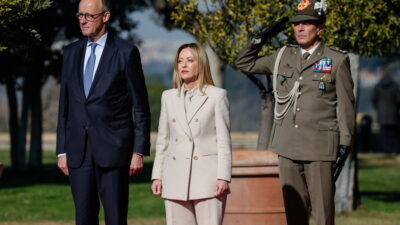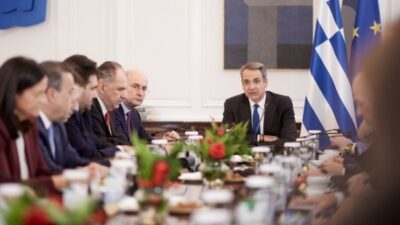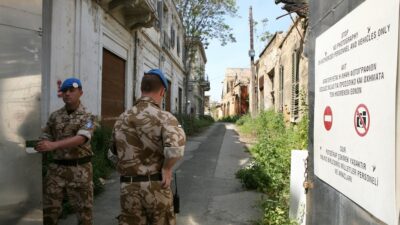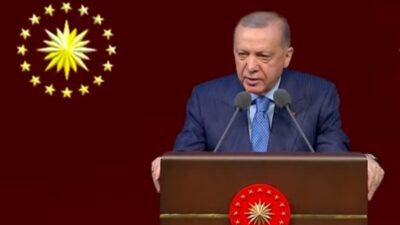Antonia Dimou: Turkey is a Mediterranean pirate with Trump’s tolerance
23/07/2020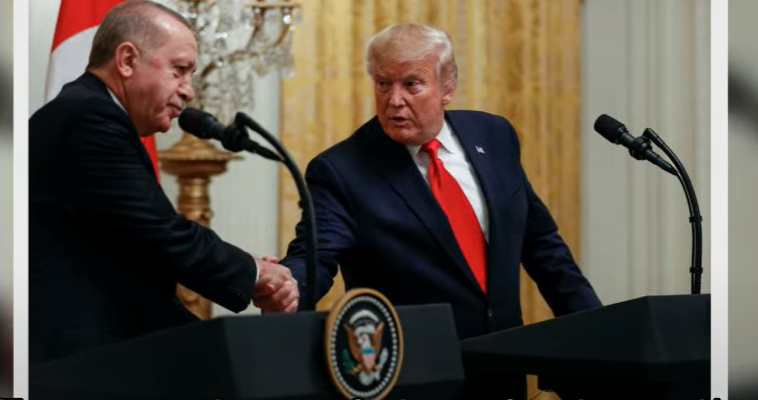
Turkey’s revisionist policy aims to consolidate the Turkish presence in the eastern Mediterranean and to plunder much of the Greek continental shelf and the EEZ, using the Sarraj government in Libya as a vehicle. The Turkish-Libyan Memorandum of Understanding, signed a few months ago on military cooperation, blatantly violates the UN arms embargo, while another memorandum on the demarcation of maritime borders / zones violates UN Law on the Sea (UNCLOS).
The constant threats and gunboat diplomacy have reached the edge of a war crisis and are an integral part of the Turkish revisionism towards Greece. This revision is favored by the partial withdrawal of the United States from the wider region (focusing on Syria) and the privileged personal relationship of the Turkish president with his American counterpart.
Erdogan’s privileged personal relationship with Trump is clearly reflected in the book “In the Room Where It Happened” by former National Security Adviser John Bolton. The two presidents’ communication on issues such as the Turkish coverage of the US military withdrawal gap from Syria and the fate of the Kurds reflects the superiority of Erdogan’s arguments over Trump.
This is at a time when the American president, according to the former National Security Adviser, is possessed by vices that affect his personal credibility and undermine the interests of the USA. Of particular interest is Bolton’s finding that Erdogan’s phone calls were a unique experience, as the Turkish president spoke in a tone and voice similar to that of Mussolini as he delivered speeches from his balcony in Rome.
“In the room where it happened”
The case of the Turkish state-owned bank Halkbank seems to have dominated the two men’s telephone conversations. The risk of revealing the financial interests of Erdogan and his family through Halkbank, according to the former National Security Adviser, was the motive for the Turkish President’s persuasion to his American counterpart to stop the US judicial investigation against the Turkish state. .
Turkey is known to have violated US and international sanctions against Iran when, through the Turkish state-owned Halkbank, revenues from the illegal trade in gold and Iranian oil were laundered. The Turkish haggling seems to have found fertile ground for a number of critical issues, with the exception of Pastor Branson’s release.
The US president had set clear red lines (both politically and economically) for the pastor’s release, with the possibility of new heavy US sanctions looming as a Damocles sword over Turkey. It was preceded by sanctions imposed by the US Department of Commerce against the Turkish Ministers of Justice and Interior.
President Trump’s priority has been the political satisfaction of the faithful of the Evangelical Church to which Pastor Branson belongs and is one of the main electoral reservoirs of the Republican Party. A poll conducted by the Pew Research Center showed that 77 percent of white Evangelicals voted for President Trump in the 2016 election. Even temporarily, Erdogan’s political greed made him an enemy to the American president.
Tolerance of Turkish provocation
The two presidents’ close relations are based on the masterful way in which Erdogan handles Trump and largely explain the green light given to Turkey to launch military operations in northern Syria and Libya. They also explain the US tolerance of systematic Turkish violations of airspace and territorial waters belonging to various countries in the Eastern Mediterranean.
In essence, the Erdogan-Trump interpersonal rapprochement has undermined US security interests in the wider Middle East. This is because Ankara has consciously moved away from the Western fold with the acquisition of the Russian S-400 anti-missile system, the criminal prosecution of US embassy staff and the suppression of any kind of democratic voice, imprisoning journalists for allegedly inciting hatred and public outcry over Ankara’s military operations in Syria and Libya.
In this peculiar US-Turkish context, Greece is called upon to face Turkish revisionism, components of which are the expansion of Turkish influence in the Eastern Mediterranean and the opening of new fronts in Syria and Libya. The vehicle for the methodical implementation of the Turkish revision vis – a – vis Greece in the current period is the two Memoranda of Understanding signed by Ankara with the Sarraj government.
Aggressive Turkish claims
The first memorandum concerns the demarcation of maritime zones, arguing that Turkey has the largest continental shelf in the Eastern Mediterranean. This memorandum ignores the right of the Greek islands to a continental shelf and an EEZ, as well as the fact that there are no common maritime borders between Turkey and Libya.
In fact, the supposed demarcation line provided in the memorandum satisfies the firm position of Turkey that the Kastellorizo complex, as well as Crete, do not have a continental shelf. In this way, an area of 39 thousand square kilometers south of Crete is appropriated and the Turkish position is consolidated that the EEZ of Greece does not touch the Cypriot EEZ at any point. The second memorandum focuses on co-operation between the two countries in security and the military sector.
It has been used to send Turkish military equipment, in violation of the international arms embargo, in support of the Tripoli-based Sarraj government, as opposed to another government based in the eastern city of Tobruk and backed by General Haftar. In addition, the memorandum provides the legal basis for the establishment of two Turkish military air bases in the cities of Tripoli and Watiyah.
Both Turkish-Libyan memoranda serve Turkish revisionism. On the one hand, they give Turkey critical strategic depth in North Africa, and on the other hand, they facilitate the implementation of Turkish plans to control Europe from the sea, through the exercise of sovereignty in the Eastern Mediterranean. Under the circumstances, the Greek reaction to the Turkish revisionism must be immediate and multifaceted.
Greek diplomatic and military response
At the diplomatic level, Greece country is moving jointly with Egypt, Saudi Arabia, Bahrain and Cyprus, aiming at the de jure cancellation of the Turkish-Libyan memorandum on the delimitation of maritime zones. The recent verbal communication of the five countries, submitted to the UN Secretary-General, sets out the reasons why the memorandum does not meet the registration procedures (as provided for in UN General Assembly resolution 73/210). The main argument concerns the non-ratification of the memorandum by the internationally recognized Libyan House of Representatives.
Equally important at the diplomatic level is the uninterrupted briefing by Greece of the Hellenic Caucus and Hellenic-Israeli Alliance committees in the US Congress, as well as officials in the White House and the US National Security Council. Turkish aggression in the Aegean and Eastern Mediterranean. The goal is to denounce Turkish revisionism, which undermines both regional peace and stability, as well as US energy and security interests.
In addition, Greece must methodically continue any negotiations with the internationally recognized Libyan House of Representatives for the determination of the Greek-Libyan maritime zones, as well as proceed quickly to the opening of a Greek consulate in Benghazi. Any agreement on Athens’ maritime zones with the Libyan parliament will enjoy international legitimacy, as opposed to the relevant Turkish-Libyan memorandum.
This is because the latter is formally invalid, as it has been agreed with the Sarraj government, whose legal term has expired years ago, and the appointment of its president and ministers has not been approved by the Libyan parliament, as provided for in its provisions. Libyan Political Agreement. At the military level, Greece must, as a country working for regional stability, assist with more military means in the European operation “IRINI” (if this is required for enforcing compliance with the international arms embargo on Libya).
In parallel, Athens needs to further strengthen multinational land, naval and air exercises with the participation of the United States and France to combat asymmetric threats, such as terrorism, and counter offensive actions, wherever they emanate.
Greece’s multifaceted diplomatic and military activity, combined with its determination to defend its national interests militarily, whenever required, is the best bulwark against rampant Turkish revisionism.
